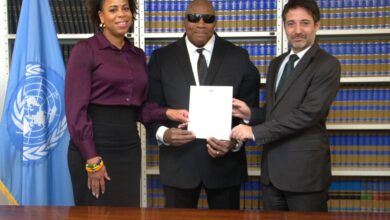The Caribbean Community (CARICOM) remains deeply concerned that human actions, including the emissions of greenhouse gases, have led to the rapid ongoing decline of marine ecosystems from coastal to deep sea, with particularly acute and large historical losses in coastal marine ecosystems. The Community is also concerned that the human influence on the degradation and alteration of the world’s ocean will continue for centuries and millennia even after damaging activities such as emissions cease.
CARICOM is alarmed at the scientific findings that Small Island and Low-lying Coastal Developing States (SIDS) will be disproportionately impacted and suffer significant loss and damage as the state of the ocean and their surrounding marine environments worsen. This is very concerning given that the ocean and the ecosystem services that the marine environment provide are essential to planetary sustainability and to human survival, and can play a critical role in the achievement of global climate goals, healthy and wholesome societies, as well as sustainable economies.
The Region is resolved to promote and to contribute to the development of policies for the protection of and the preservation of the marine environment and sustainable development, in furtherance of our regional commitments under the Revised Treaty of Chaguaramas, and our global commitments emanating from 2030 Agenda for Sustainable Development, the United Nations Decade of Ocean Science for Sustainable Development 2021 – 2030, the Paris Agreement, and the Kunming-Montreal Global Biodiversity Framework.
While ocean knowledge is developing, it is not comprehensive and therefore not actionable, and therefore actions must be based upon the precautionary principle. Additionally, there is limited understanding of the high seas which make up nearly two-thirds of the world’s oceans, cover nearly half of the earth’s surface and comprises some of the most biologically important, yet least protected and most critically threatened ecosystems in the world. This creates a governance gap in high seas protection, and this gap engenders a critical lack of consistent and effective oversight of marine areas beyond national jurisdiction.
CARICOM underscores the importance of the guiding principle of equity and sharing of both benefits from and responsibilities for, areas beyond national jurisdiction, since different countries and regions have differing needs, priorities and capacities.
In light of the foregoing, the Caribbean Community (CARICOM), representing both Small Island and low-lying coastal Developing States that are integral to and dependent on the Caribbean Sea and the wider Atlantic Ocean:
- Welcome the resumption of the intergovernmental conference to conclude an international legally binding instrument for the conservation and sustainable use of marine biodiversity of areas beyond national jurisdictions (BBNJ Agreement)
- Underscore that the BBNJ Agreement should establish an ambitious framework for the conservation and sustainable use of marine biological diversity of areas beyond national jurisdiction, with a view to enabling equity and effectiveness, and to this end support:
- a fair and equitable benefit sharing regime, including monetary and non-monetary benefits, for marine genetic resources of areas beyond national jurisdiction and digital sequencing information on marine genetic resources that ensures all humanity for generations to come will benefit from utilisation of those resources and information;
- an inclusive transparent consultative process guided by science for the establishment of area-based management tools, including marine protected areas;
- a robust threshold and transparent process for the conduct of environmental impact assessments, with global oversight for activities that may be allowed and an agreed decision-making standard for activities that should not be allowed;
- adequate, accessible, sustainable and predictable financing to support implementation of the BBNJ Agreement while delivering capacity-building and the transfer of marine technology to developing countries, in particular for SIDS and be responsive to their needs and priorities;
- additional funding arrangements for a liability mechanism;
- an effective framework of institutional arrangements that will support the provisions of the Agreement and ensure decision making based on the best available scientific information and incorporate the traditional knowledge of Indigenous peoples and local communities, facilitate effective capacity building and transfer or marine technology, and ensure the required generation of, access to, and use of funding towards the aims of the BBNJ Agreement; and finally;
- due recognition of the special circumstances of SIDS as an operational principle of the Agreement.
- Urged United Nations member states to work in the spirit of cooperation and to conclude negotiations on the Agreement at the fifth resumed session; and
- Affirmed CARICOM’s unswerving commitment to attain an ambitious, inclusive, and just BBNJ Agreement as an effective mechanism for good governance of areas beyond national jurisdiction for the benefit of all states and both present and future generations.
Nassau, The Bahamas
17 February 2023






